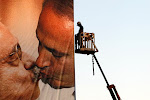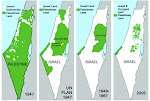Yoram Kaniuk remembers the Nakba
 How powerful is a word?
How powerful is a word?
The word Nakba is officially verboten. Referring to the recreation of Israel in 1948 as the 'Catastrophe' is being banned from Arabic schoolbooks following the reversal of a court decision.
The distinguished Israeli writer Yoram Kaniuk, who was there to witness Israel's birth pangs and whose opinion carries alot of weight, had his say about the Nakba, thereby provoking some controversy in the Yediot Ahronot, the most popular Hebrew daily paper. He argues 'Our defeated enemy is not a geometrical unknown; it’s a people that still exists'
I remember the Nakba
This week I visited the Knesset for the third time in my life. The first time was during the War of Independence, when the site was not yet under Israel’s control.
Today, it’s an immense building. If Netanyahu’s policy of going to war against the Americans will be implemented, even the US Army won’t be able to take over the Knesset building. Israel’s parliament looks like the formidable fortress of a strong nation. Barbed wire, thick walls, police officers, and checkpoints. An ugly citadel surrounded by even uglier buildings.
I haven’t seen a more fortified fortress in any other capital. And so, even if the planned war takes place, the Knesset will survive. This is what we call a secure democracy.
In the fortified building that is Israel’s Knesset, officials are redrafting history, as well as the future. The future we looked forward to once upon a time, when the hill was still empty. Via the Nakba Law and the education minister’s plan to remove the term from the curriculum, it appears that the future will be all about erasing everything that exists.
I remember the Nakba. I saw it to a much greater extent than the education minister, who apparently only heard about it. It was a harsh, merciless campaign of young soldiers who spilled their blood while fighting a determined enemy that was eventually defeated. Yet the enemy that was defeated is not a geometrical unknown, but rather, a people that still exists. Its parents and grandparents fought well. Otherwise, we wouldn’t have suffered so many casualties.
I was wounded in battle, but I believe that the education minister must educate our young people to be heroes by teaching them that this war had losers too, and that they too have a narrative. They don’t have the country that was theirs but they have a history, and no education minister can erase the defeated people from its powerful memory. The Nakba fighters fought heroically, but we fought better.
The fact that the State of Israel exists today is the victory, rather than the erasing of the circumstances of its establishment from the losing side. The Germans tried to teach German history without the Holocaust. It didn’t work. The Holocaust is a powerful element in Germany today, because it was a powerful event. The same is true for all sorts of hasty laws by ministers who wish to correct history.
Our education minister did not invent this idea. Stalin made sure to write a new Russian history, yet the past reclaimed it. A narrative that turns into a myth constitutes more history than any education minister can create; even if Arab children here learn Bialik’s songs and are forced to hoist Israel’s flag over their homes every morning and sing our national anthem every evening, at night, in hiding, they will read Arabic poetry. Because Arabic poetry is them. There’s nothing we can do about it.
While inside the Knesset fortress I thought that maybe it is still possible, before my death, to turn this state into a Jewish State – not one populated by zealous masses called Jews, but rather, Jews like we used to be; a state where we respect those who fought against us and were defeated. When that will happen, we will see the establishment of an Arab state alongside us, and the city of Jerusalem, also known as al-Quds, will become the capital of two states, one Jewish and one Arab. And then peace will come to Israel. Amen.
Meanwhile, the signs on the streets are being switched, and only Hebrew placenames will be in use if the transport ministry gets its way.
:
The Israeli transport ministry will soon get rid of Arabic and English names for cities and towns on road signs, keeping only the Hebrew terms.
"Minister Yisrael Katz took this decision that will be progressively applied," a ministry spokeswoman told Agence France Press.
Currently Israeli road signs are written in Hebrew, Arabic and English, with the city names in each language. So Jerusalem is identified as Yerushalaim in Hebrew, Jerusalem in English and Al-Quds in Arabic (along with Yerushalaim written in Arabic script).
Under the new policy the Holy City will only be identified as Yerushalaim in all three languages. Nazareth (Al-Nasra in Arabic) will be identified as Natzrat and Jaffa (Jaffa in Arabic) will only be written as Yafo.
WHen signs went up labelling my neighborhood, not as Abu Tor, but as Givat Hananiya, the residents got confused. Visitors drove right by. Mail deliveries went astray. Now there's a movement protesting the deletion of Arabic and English names from our cities and streets. Those who rewrite history may be doomed to repeat it.
Hat tip to Irris for the Kaniuk piece!
























